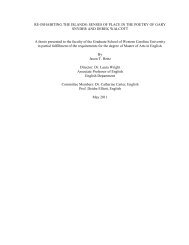SUMMERS, KAREN CRADY, Ph.D. Reading Incest - The University ...
SUMMERS, KAREN CRADY, Ph.D. Reading Incest - The University ...
SUMMERS, KAREN CRADY, Ph.D. Reading Incest - The University ...
Create successful ePaper yourself
Turn your PDF publications into a flip-book with our unique Google optimized e-Paper software.
89<br />
But Shakespeare has Gower introduce the play with an immediate condemnation of the<br />
girl: “Bad child; worse father! to entice his own / To evil should be done by none:” (Prol.<br />
29-30). Though the multiple versions of this tale that Shakespeare used as his sources<br />
may account for some of this discrepancy between the two accounts of the unnamed<br />
daughter, Gower the Chorus treats her with notably less sympathy than Gower the poet<br />
had, and with a great deal less sympathy than was accorded to incestuous Canace. Gower<br />
ameliorated the incest on the part of these young female characters in the Confessio<br />
Amantis through the notion of kynde which put the burden of guilt on the fathers.<br />
Although sexual attraction is natural, the adult father should be able to restrain his<br />
passion, be it either sexual desire or anger, through reason; his use of coercion against his<br />
young and helpless daughter renders him the culpable partner, according to Gower. But<br />
Shakespeare’s Gower seems to discount this notion.<br />
Gower’s Tale of Apollonius in Confessio Amantis describes the daughter of the<br />
incestuous King Antiochus with the words “pierless of beauty,” “tendre and softe,” and<br />
“tendre and ful of drede.” He relates that she “couthe not hir maidenhede defende,”<br />
(Confessio Amantis VII.286- 301) implying at least an attempt at such a defense. <strong>The</strong> girl<br />
makes much mention of her disgrace while the father’s own shame is entirely absent. As<br />
further evidence of the father’s tyranny, the only advice the girl’s nurse can offer is to let<br />
the king do as he wishes because “whan thing is do / there is no bote, / So suffren thei<br />
that suffer mote” (VIII.339-40). This daughter is clearly an innocent victim whom<br />
Gower’s readers were surely moved to pity. But in the intervening centuries the girl’s
















